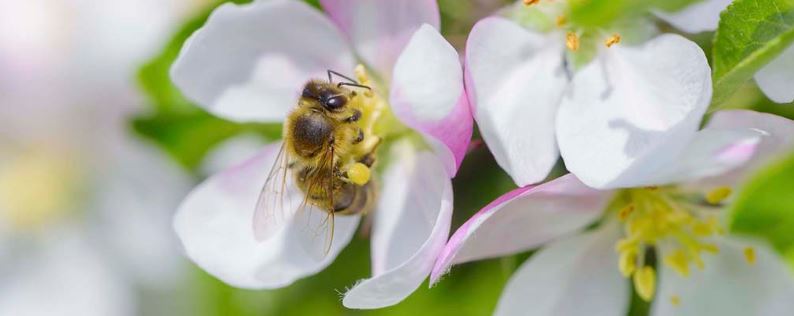


 3:7:16
3:7:16  2024-09-06
2024-09-06  1485
1485

Some of our favorite food crops around the world aren't reaching their full potential because of fewer visits from the insects that pollinate them, a new study has found.
Insects that provide the crucial service of pollination are declining in masse, and that has serious consequences for the world's food crops, 75 percent of which depend at least partially – if not entirely – on insect pollination.
While this doesn't include major food crops like rice and wheat, pollination is essential to what the study's first author – ecologist Katherine Turo from Rutgers University in the US – refers to as "nutrient-dense and interesting foods that we like and are culturally relevant".
"If you look through a list of crops and think about which fruits and vegetables you're most excited to eat – like summer berries or apples and pumpkins in the fall – those are the crops that typically need to be pollinated by insects," Turo says.
And yet, there's a lack of experimental research on pollinator limitation in crops. While we know the phenomenon is impacting global food supplies, its prevalence has so far been unclear.
Many studies have relied on estimates of maximum potential yield based on hand pollination, which can overestimate pollen limitation. Directly measuring 'real-world' impact, by tracking the number of insect visits to crop flowers, and the resulting yield, can give a more realistic picture.
To measure just how big of a dent pollinator limitation is making in food production, the multinational team analyzed one of the most comprehensive global datasets of crop pollination, which is tracking 32 of the leading commercial crops and commodities that depend on pollinators.
This open-source database, CropPol, is an international effort that has so far captured three decades' worth of data on crop pollinators, flower visits, and pollinations.
Within this detailed picture, Turo and colleagues found that up to 60 percent of global crop systems are being limited by insufficient pollination. The phenomenon is affecting 25 of the 49 different crop species analyzed, with blueberry, coffee, and apple crops being the worst affected.
Pollinator limitation is occurring in 85 percent of the countries in this database, spanning all six continents represented.
"Our findings are a cause for concern and optimism," syas Turo.
"We did detect widespread yield deficits. However, we also estimate that, through continued investment in pollinator management and research, it is likely that we can improve the efficiency of our existing crop fields to meet the nutritional needs of our global population."
The researchers estimate that increasing pollinator visitations in low-visitation fields to the levels being observed in the best-performing fields could close the gap between low- and high-yielding fields by 63 percent.
"If field managers could improve consistency across high- and low-yield fields, much of the observed yield problems could be addressed," Turo says.
They found pollinator limitation is slightly less likely in areas with more forest land cover within 1 kilometer (0.6 miles) of the field, and although this effect was not universal, it does hint at the role wider ecosystems surrounding farmlands may be playing in the survival of beneficial insects.
But since they did not identify any patterns among the 12 datasets that were most strongly affected by forests, the authors say further study is needed to better understand pollinators' sensitivity to forested land cover.
"Crop yields, which measure the amount of crops grown per unit area of land, are relevant to assessing the adequacy of the world's food supply relative to its population," Rutgers ecologist Rachael Winfree says.
"Our findings show that by paying more attention to pollinators, growers could make agricultural fields more productive."
That might be harder than it sounds – insects are being hit with a lethal onslaught of disease, pesticides, shifting seasons, and habitat loss.
Perhaps quantifying these tiny but mighty allies' services to our billion-dollar industries will help us to take the threats they face more seriously.
Reality Of Islam |
|

A 1.98-squa

Researchers

A well-know

Scientists
 9:3:43
9:3:43
 2018-11-05
2018-11-05
10 benefits of Marriage in Islam
 7:5:22
7:5:22
 2019-04-08
2019-04-08
benefits of reciting surat yunus, hud &
 9:45:7
9:45:7
 2018-12-24
2018-12-24
advantages & disadvantages of divorce
 11:35:12
11:35:12
 2018-06-10
2018-06-10
 6:0:51
6:0:51
 2018-10-16
2018-10-16
 8:4:21
8:4:21
 2022-01-08
2022-01-08
 8:25:12
8:25:12
 2022-03-09
2022-03-09
 10:47:11
10:47:11
 2022-11-22
2022-11-22
the happy life of mankind requirement
 6:36:36
6:36:36
 2022-01-25
2022-01-25
 4:26:43
4:26:43
 2022-02-21
2022-02-21
 1:38:41
1:38:41
 2021-12-08
2021-12-08
 3:42:22
3:42:22
 2021-12-24
2021-12-24
 5:41:46
5:41:46
 2023-03-18
2023-03-18
| LATEST |